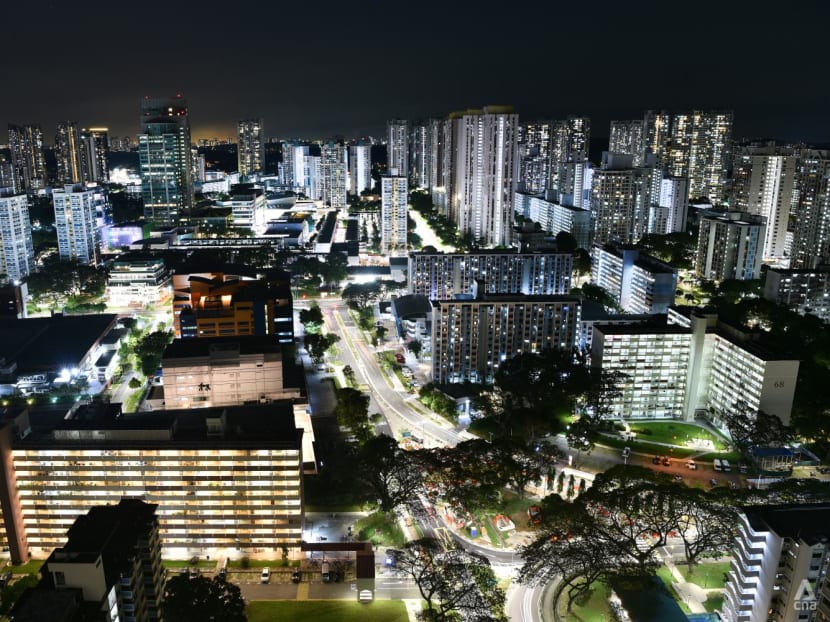‘Harder hitting’ cooling measures will slow home sales, en bloc market: Analysts

HDB flats lighted up at night in Toa Payoh (Photo: Jeremy Long)
SINGAPORE: The latest property cooling measures will likely put the brakes on home sales and price growth, while significantly hampering the en bloc market in the coming year, said analysts.
The new measures, effective from Thursday (Dec 16), include higher Additional Buyer’s Stamp Duties (ABSD), tighter loan-to-value (LTV) limits and lower Total Debt Servicing Ratios (TDSR).
They are “harder hitting” compared to the previous round of cooling measures imposed in 2018, particularly because of a bigger increase in ABSD rates, said analysts.
The experts added that although there were signs the market was heating up, the “decisiveness” with which the measures were imposed was still unexpected, with the rules announced about 25 minutes before they were implemented.
SALES AND PRICES WILL MODERATE
As with previous cooling measures, there will be a “knee jerk reaction immediately as everyone tries to understand and assess the impact”, said Mr Lee Sze Teck, Huttons Asia’s senior director of research.
This means that for December, which is usually a lull period, sales are expected to slow further, he said. New home sales for December could ease to between 400 to 600, and volume could slow in the next few quarters in 2022, said Mr Lee.
Coupled with the limited pipeline of new launches next year, new home sales for 2022 are expected to “trend down from the current 13,000 units to a normalised 9,000 to 10,000 units”, said Ms Tricia Song, head of research for Southeast Asia at CBRE.
Prices could be flat, or increase by 1 per cent to 3 per cent next year, she said.
Looking back to 2018, which saw the last round of cooling measures, data shows that prices declined slightly in the fourth quarter of 2018 and first quarter of 2019, before rising “gently” in the second quarter that year, said Mr Ong Teck Hui, a senior director of research & consultancy at JLL.
“Following the latest measures, we also expect sales volume and price increases to be moderated,” he said.
Mr Desmond Sim, CEO of Edmund Tie, said that although volume will taper off, the measures will not cause “a total nullification of enquiries” because there are still genuine buyers in the market.
EN BLOC MARKET HAMPERED
Another immediate impact will be on the en bloc market, which recently appeared to be gaining momentum.
Under new rules, entities buying residential properties must pay 35 per cent ABSD – up from 25 per cent – if they cannot sell all their units in five years. There is also an additional non-remittable 5 per cent ABSD for developers.
Ms Tang Wei Leng, Colliers’ managing director, said developers will have to consider the "additional tax impact and buyers’ concerns about the future selling prices, as well as how these will affect demand and the take-up rate".
“This will necessarily result in land price adjustments," she said.
She added that en bloc hopefuls will have to review their expectations, as it might take longer to “manage and negotiate the price gap” that results from these cooling measures.
Professor Sing Tien Foo from the National University of Singapore’s (NUS) Institute of Real Estate and Urban Studies added that developers will certainly be more selective about their land acquisitions.
“The bigger plots will get more and more difficult (to work with) because of the 35 per cent ABSD. To sell big projects – above 500 units – is quite challenging,” he said.
Edmund Tie’s Mr Sim said this news has not “killed” the en bloc market entirely.
A project could still be sold en bloc if its location and pricing are attractive, he said, adding that developers will turn to the collective sale market if Government Land Sale (GLS) sites do not suit their plans.
The Real Estate Developers’ Association of Singapore (REDAS) called the measures “tough” and “sudden”, given that the market is “just beginning to emerge from the challenging COVID-19 situation”.
It said the ABSD increase will put “immense additional pressure” on developers, who have to “compress their development, sales, project completion period and land replenishment cycle time”.
REDAS reiterated its call for authorities to “differentiate remission criteria” for projects of different sizes, especially given the current challenges the construction sector faces in meeting completion timelines.
It also urged authorities to consider providing “leeway” for certain cases involving recent land purchases by developers.
CRIMPING FOREIGN DEMAND
ABSD rates for foreigners have also been raised to 30 per cent, in the hopes of stemming the flow of “hot money” into the property market, said Huttons’ Mr Lee.
He pointed to a “sharp increase” in properties being bought by foreigners in 2021 compared to last year.
But PropNex Realty CEO Ismail Gafoor said the 30 per cent ABSD for foreigners appears “too harsh”.
“Looking at the caveats lodged, foreigners accounted for only about 4.5 per cent of non-landed new private home sales this year – the majority of the demand was from Singaporeans," he said.
Regardless, as a result of the hefty foreigners, the PropNex team expects Core Central Region (CCR) home prices to face more “downward pressure”, compared to other parts of the country.
“We anticipate that some developers of CCR projects may trim average prices by 5 to 8 per cent in 2022 in response to the measures, slowing demand from foreign buyers and the ample unsold supply in the CCR.”
SUPPLY MEASURES
The Government also announced new measures to ramp up supply, including launching more Build-to-Order flats and putting out more GLS sites.
But NUS’ Prof Sing said the impact of this will take a long time to be felt. “You cannot just sell the land today and (expect) tomorrow, the supply will come to the market.”
Putting the site up for tender, evaluating bids, finalising and designing the project will take a long time, he said.
“It is a bit too slow and too late to actually correct or have any effect on price ... but this is the nature of land sales, you can’t help it.”
Nevertheless, the sites released on the GLS confirmed list will possibly still attract interest, given that they are below 500 units – making them more palatable to developers amid a tougher market environment, he said.
KEEPING THE MARKET STABLE
Overall, analysts said the measures are largely appropriate for encouraging prudence, rooting out speculative buying, and prioritising homes for genuine buyers.
Mr Sim reiterated that first-time buyers are exempt from the ABSD rates, which "reinforces" the point that authorities want to keep homes affordable for this group.
"At the same time, if you have means to buy a second or third home ... (the measures) make you reconsider if you are over-gearing yourself, especially because we are not in the most stable of times right now."








